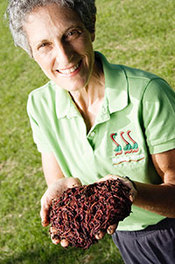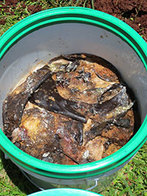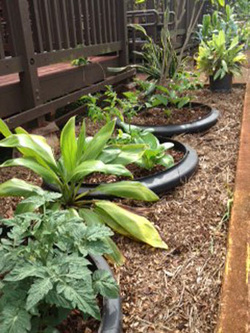|
November 11, 2013 | by David Atcheson, Transition Oahu
Waikiki Worm Co. Teams with Pearl City High School in Ambitious Waste Reduction ProgramLet's imagine a dream project for waste reduction. Say you were able to combine worm composting, hot composting, food waste conversion with black soldier fly larvae, bokashi buckets, and sheet mulching at a single Oahu high school of 1800+ students. How much waste could you divert? What learning opportunities would the program create? How much work would it take?
 Mindy Jaffe holds up Mindy Jaffe holds upcomposting worms It turns out we don't have to imagine such a project at all. At last Thursday's Food Waste Networking Event, hosted by Kupu's RISE program, Mindy Jaffe of Waikiki Worm Company described a project well underway at Pearl City High School (PCHS) that uses all these methods to divert about 1,000 pounds of food waste per week, creating valuable compost for use on-site.
Together with a program to integrate tree and shrub trimmings, waste paper, newspaper, and and cardboard into the composting processes, Jaffe estimates the total annual waste diversion to be 80 tons per year. Rolloffs Hawaii, the contractor that empties the school dumpsters, now has much less to pick up and there is the potential to greatly reduce the number trips it makes to the school.  Fermented food waste in Fermented food waste ina bokashi bucket The high school's resource recovery program has transformed kitchen and cafeteria food waste from a liability into an asset that is helping create beautiful and productive gardens on school grounds. Take the bokashi component, for example. Bokashi is a process that uses fermentation in sealed buckets to convert any kind of food waste (including meat and dairy) into material that can be safely buried, adding rich organic matter that feeds vegetables or other plants. At PCHS, volunteers dig holes in the hard, clay ground, sometimes using rented power diggers similar to jackhammers. The contents of several 5-gallon bokashi buckets goes into the bottom of the holes and is mixed with and topped by compost and soil. The holes are bordered by offcuts from plastic culvert pipes, a byproduct of producing Jaffe's Pipeline worm systems. Within two weeks, the little circle gardens are ready to plant.
 Bokashi gardens at Pearl City High School Bokashi gardens at Pearl City High School(photo from Malama Kauaʻi) The project has created diverse learning and volunteer opportunities for PCHS students. Students can feed worms, garden, collect food waste, and build compost piles. Jaffe notes they can even participate in "sophisticated science fair projects such as distilling biofuel from the lipids squeezed from black soldier fly larvae." There is an emphasis on involving special education students. "They provide important support services," said Jaffe, "including washing buckets, feeding and watering worms, moving mulch, making bokashi starter, screening and packaging vermicast for sale, and weighing and measuring."
While volunteer power is an important component of the resource recovery program, Jaffe says that schools cannot be expected to handle such a comprehensive program on their own. Significant daily maintenance tasks would be difficult to sustain given existing demands on teachers and school staff, vacations, and class priorities that can change by semester or through teacher turnover. So, after a project is up and running, some level of ongoing project staffing is required. For the PCHS resource recovery program, Jaffe says it takes two people working four hours a day to keep it functioning smoothly. One of those people is paid hourly by Waikiki Worm Co. The other is Jaffe herself, who is temporarily volunteering her time and labor as an investment in the demonstration project. Jaffe is exploring ways that money saved by Rolloffs Hawaii could fund Resource Recovery Specialists. Sending trucks to pick up dumpsters daily is expensive. By providing an option for on-site sorting and processing of organic waste and reducing dumpster pickups to two per week, the company could reduce its costs. Combine that with the resulting enrichment of both the soil and the learning opportunities at the school and you've got a formula that can be sustained and and replicated at other schools and institutions. "Everybody wins on this one," says Jaffe. Visitors are welcome to tour the resource recovery operations at Pearl City High School. To schedule a visit, contact Mindy Jaffe at [email protected]. |
Here are some other links and resources related to the PCHS project and the Food Waste Networking event. Rewarding Internships for Sustainable Employment The trailer for the film screened at the event The ProtaPod Two articles about Mindy Jaffe: The Greenhouse Hawaii Growing Green Schools Program Aloha Harvest |
- HOME
- Blog
- Working Groups
-
Calendar
- Upcoming Events
- Oahu Monthly Permaculture Design Course - 2016
- 10/24/15: Class, "How to Grow Sprouts"
- 8/6/15: Transition Oahu/Oahu TimeBank Plant Based Potluck
- Once a month, 6 weekend Permaculture Design Certificate Course, begins 3/21/15
- 1/22/15: Movie Cowspiracy at the Capitol
-
Calendar - Archived Items
>
- ShareFest Honolulu
- 11/27/14: Thanksgiving Day Potluck
- 11/13/14: Movie - Cowspiracy
- 7/10/14: Potluck & Bicycling Presentation
- Waimanalo Permaculture Design Course 2014
- 5/15/14: Potluck and Sharefest planning
- 4/8/14: In Transition 2.0 Screening at the Capitol
- 3/13/14: Potluck & Movie, Time As Money
- Oahu Permaculture Design Course - Winter 2014
- 1/16/14: Movie: In Transition 2.0 & Potluck
- 11/28/13: Thanksgiving Potluck
- 9/12/13: Move & Potluck: Money & Life
- 8/5 - 8/18 Permaculture Design Course, Waimanalo
- 7/11/13: Movie & Potluck, Permaculture in the Tropics and Discussion with Matt Lynch
- Contact Us
- Videos
- Links

